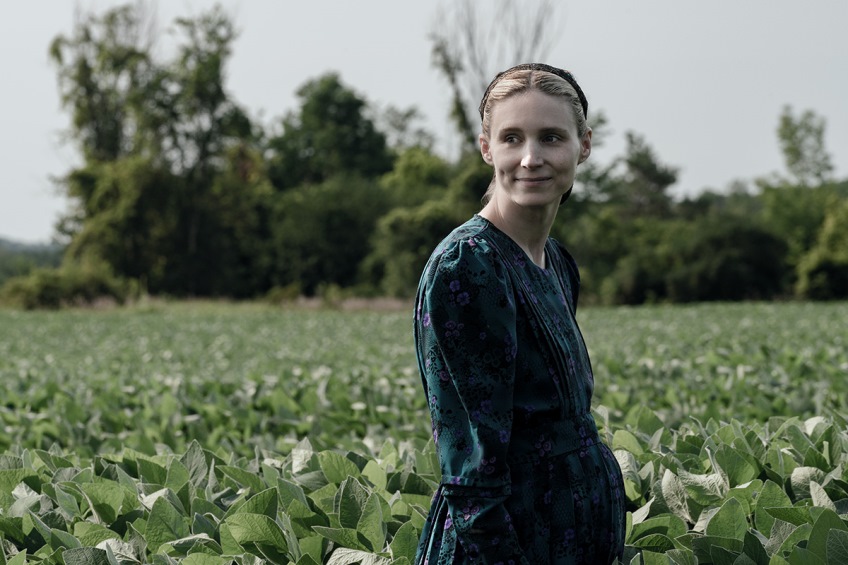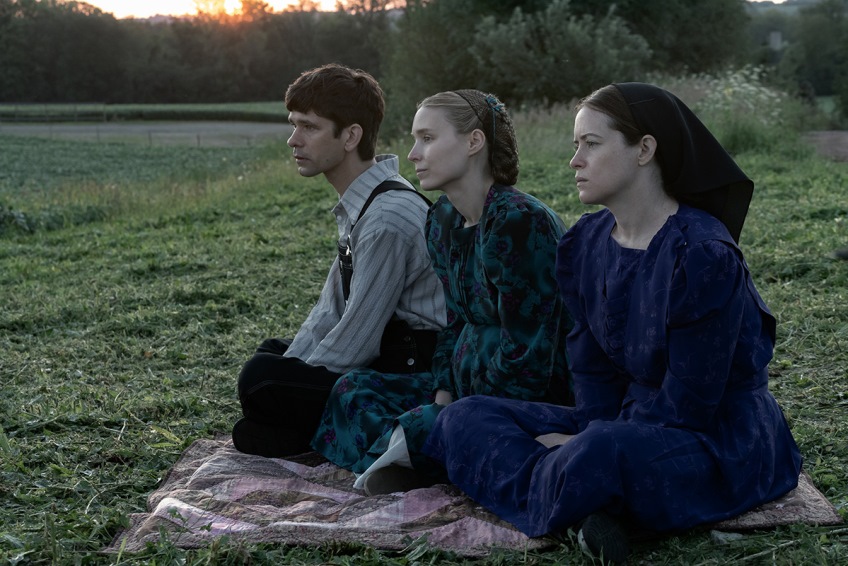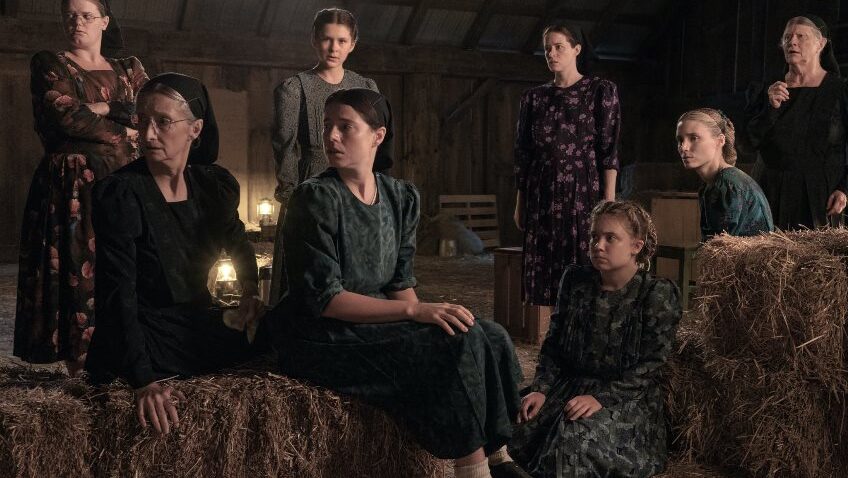Joyce Glasser reviews Women Talking (February 10, 2023) Cert 15, 104 mins.
Since women are known for their ability to talk – and to talk with one another in a way that men do not, you might wonder what’s the big deal here. The women in this film, played by several famous actresses and others less well known, are not accustomed to talking, let alone to making decisions. The men do that. Isolated from the world their days are taken up with physical labour on the farm, cooking and cleaning their homes and bringing up children – a lot of children – and on Sunday going to Church. They are Manitoba’s Mennonites.
Miriam Toews is a former Mennonite from Manitoba, Canada who, at 18 chose to leave her family, religious community and religion. Toew’s book, Women Talking, is about a group of women in an unidentified Mennonite community who must also face a big decision about their, and their children’s, futures.

The book is based on a true story about a Mennonite community in Bolivia – which is what gives the film its credibility and morbid fascination. Between 2005 and 2009, 150 women and girls (as young as four) were raped by nine men using a drug designed to sedate animals to sedate them. There is no evidence the women reacted as do the women in writer-director Sara Polley’s film, but the culprits received long prison sentences. The film ignores the fate of the men and suggests a complicity in the entire male community.
In an opening prologue a young woman wakes up in bed alone reacting to visible bruises and wounds that we see on and inside her upper thighs. It is 2010 in an unidentified farming community of Mennonites that must be in the USA or Canada as everyone speaks English. Polley, whose debut feature was the impressive, Away from Her a female-centric Alzheimer’s film starring Julie Christie drops us into the story in medias res. Aside from this prologue we do not hear about the sexual violence, but what we already know is what grips us and sustains our interest.
The women have had enough, and when the action begins, the police have carted off the suspects to town. Unlike in the true story where only a few husbands and fathers tried to protect the suspects, here all the men leave their farm work to go off to bail out the suspects. It sounds unlikely, given that in the Mennonite religion girls (daughters) must be virgins to marry and women cannot have sex outside of marriage, but it’s a pretext to leave the women alone in a race against the clock to reach their decision.
They must figure out how to continue their lives with the realisation that it was not – as the men had been telling them – the work of the devil when they woke up bloody and groggy. The alternatives the women vote for are: stay and do nothing (very unpopular), stay and fight, presumably for change, or leave.

A debate on the alternatives ensues with a subset of the female population, several coming from two prominent families, elected to thrash it out in a big hayloft. There is one man present in the book and in the film, August (sensitively played by Ben Whishaw). August is a gentle misfit, who went off to get a university degree, but returned to the fold, despite the fact his parents rebelled, to teach the next generation. The women ask him to record the proceedings as they are illiterate. In the book he is the narrator, and his narration gives a fluid tone to the proceedings. In the film the women do the talking, each surprisingly articulate.
Polley gives each woman a distinct personality and a small back story related to her respective experience. Frances McDormand, who is a producer along with Brad Pitt, receives top billing, but she says little as Scarface Janz, who sustains the “stay and do nothing” camp although we can only imagine how she got her scar. Looking like a Puritan straight off the Mayflower, dowdy in a dark hood, the 65-year-old has won three Academy Awards and can afford to look even more worn, naturally wrinkled and stern than in Nomadland. Janz is the minority aware that the women will not survive in the greater world and disinclined to try due to her religious upbringing.
The other famous names blend in with the less famous. The family relationships take a while to get straight. Salome (Claire Foy), an abused mother whose three-year-old has a STD has already started fighting. When she learns the truth about her nightmares she attacks her husband, and presumably other men with a scythe and is restrained. But if she wants to stay and fight she is reminded by Greta (Sheila McCarthy) and wise Agatha (Judith Ivey) that fighting cannot be literal because Mennonites are pacifists.
Jessie Buckley (The Lost Daughter, Wild Rose, Beast) plays Mariche, Greta’s eldest daughter, a volatile mother of two. She is pessimistic that the women will lose and be forced to forgive the men or be excommunicated. Through her bitterness tinged with hopelessness, Buckley manages to introduce humour into the hayloft’s grim debate. Agatha is the oldest, and Ona (Rooney Mara), her eldest daughter, is a single woman who discovers she is pregnant from a rapist. She vows to love the child.
After August finds his place in the women’s meeting, taking his cues from the women on the boundaries of his intervention, a love story emerges between single-mother-to-be Ona and the shy August, who offers to help her raise the child.
There are many other women and girls, all of whom contribute to the atmosphere and verisimilitude of the collective, if not to the arguments. In the end, most viewers in this country at least, will wonder why anyone would need even 24 hours to make the decision. A woman’s life here is not as bad as living under the Taliban, but abuse is not limited to marauding rapists.
The men who call themselves husbands, brothers and fathers do not see fit to educate the women who cannot even point to where they live on a map. The men see the women as cooks, cleaners and breeders to supply free labour and to perpetuate this closed community. What we viewers have to accept is that the women see themselves in the same way. That Polley has the men go to court to bail out the rapists, would, for most other groups, negate the need for any talking.




